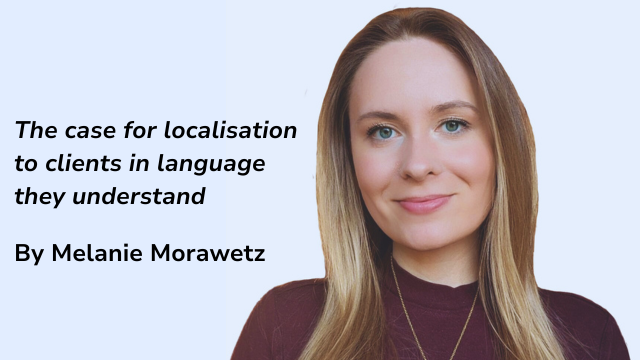-
QUALIFICATIONS
- For Linguists Worldwide
- For UK Public Services
- Preparation
- Policies & Regulation
-
MEMBERSHIP
- Join CIOL
- Professional Membership
- Affiliate Membership
- Chartered Linguist
- Already a member?
- Professional conduct
- Business & Corporate Partners
-
LANGUAGE ASSESSMENTS
- English
- All Other Languages
-
EVENTS & CPD
- Webinars & Events
- CIOL Conferences
- Networks
- CIOL Mentoring
-
NEWS & VOICES
- News & Voices
- CIOL eNews
- CIOL Awards
- The Linguist Magazine
- Jobs & Ads
-
RESOURCES
- For Translators & Interpreters
- For Universities & Students
- Standards & Norms
- CIOL & AI
- All Party Parliamentary Group
- In the UK
- UK Public Services
- Find-a-Linguist
Beyond doubt
By Michael O’Laughlin
 I work as an expert witness in the courts of Massachusetts, USA. I am in demand because I have found a niche in which language issues come quickly to the fore. I was a court interpreter for most of my life, and I am also the Director of Interpreter Training at Boston University. I realised that I could combine my interpreter experience, academic position and scholarly training at Oxford and Harvard to qualify as an expert in foreign languages and cultures. I invented this job and only found out later that there is a field called Forensic Linguistics. I promoted myself by teaching classes on language and culture problems for attorneys. In the US, defence lawyers have a listserv where they give each other tips, and there is also an office with a list of experts. Positive reviews there made me well known.
I work as an expert witness in the courts of Massachusetts, USA. I am in demand because I have found a niche in which language issues come quickly to the fore. I was a court interpreter for most of my life, and I am also the Director of Interpreter Training at Boston University. I realised that I could combine my interpreter experience, academic position and scholarly training at Oxford and Harvard to qualify as an expert in foreign languages and cultures. I invented this job and only found out later that there is a field called Forensic Linguistics. I promoted myself by teaching classes on language and culture problems for attorneys. In the US, defence lawyers have a listserv where they give each other tips, and there is also an office with a list of experts. Positive reviews there made me well known.
In most of my cases there has been a misunderstanding of some sort. Either the police assumed someone could speak English, or something critical was said in a foreign language, or someone did something that might not be a crime where they come from, but is in the US. I study a case, interview the client, write a report and testify in court.
The courtrooms I work in are usually crowded, and the atmosphere is formal and sometimes intense. The law, in action, is counterintuitive and inefficient. Because of the overarching requirement of due process, there is no immediate focus on the main issues. Instead, there are steps such as the arraignment (the formal reading of the criminal charges in court) and discovery (the exposition of proof). These steps are on different dates at least a month or two apart. I usually testify in evidentiary motions. In Anglo-American jurisprudence there are two sides trying to have their way, and an expert is automatically on one side and opposed to the other.
In court, it is normal for me to spend hours waiting to find out what will happen. As I wait, I memorise the facts of the case or consult with the attorney about which questions I should be asked. Witnesses are not allowed to present their evidence! They can only answer questions. My testimony can last an hour and rarely more than four. We cover my credentials, any language testing and my opinions on the case. That is the primary function of an expert: to render an opinion based on a proper foundation. After I am questioned by the defence attorney, the district attorney begins cross-examination, which seeks to show that I am not qualified and/or that my conclusions are unwarranted.
Types of evidence
In many of my cases, the evidence consists of statements or material in Spanish or Portuguese, as these are the most widely spoken languages in Massachusetts after English. Here is an example: in the sad case of Commonwealth vs. Raymond Collazo, a five-month-old infant died and his father was suspected of shaking him, not only because of the injuries, but also because he referred to the baby not as his son or by his name, but as ‘the kid’. One detective found this so jarring that she told Mr Collazo not to call him that.
This is what I learnt: Mr Collazo is from Puerto Rico and his English, although adequate, showed considerable Spanish interference. When he said ‘the kid’ he was thinking el nene. I prepared a detailed report on the use of the definite article before names in the Spanish language and the prevalent use of nicknames in Puerto Rican culture. Mr Collazo called his son el nene and his daughter la nena. He knew most of his neighbours only by their nicknames. In grief over the death of his son, he could not refer to him as anything other than the intimate and affectionate el nene, which translates as ‘the kid’. There was a mistrial in this case and it is not yet resolved.
In our age of mobile phones, a surprising number of crimes are well documented by texts and pictures, not necessarily in English. There are also drug cases where the language evidence, such as intercepted phone calls and wiretaps, is in a dialect, and I usually need to find a dialect specialist to help me understand everything that was said. I have even had cases where the dialect was a variant of English, such as gang vernacular, and I had to learn enough of this argot to translate the evidence into Standard English. Luckily, there are good dictionaries and glossaries. When in doubt, I get help.
A case of the wrong language
Another major category of cases I have worked on involves English proficiency. Suspects are quoted as saying things they are incapable of saying, or sign forms that they could not possibly have understood. In such cases I combine language proficiency testing and analysis of the statements or documents in question. In my experience, mistaken attribution of language proficiency in police matters is common.
This was the case in Commonwealth vs. Yan Chow. Mr Chow ran a restaurant in Boston’s Chinatown along with several relatives, including his wife. They had a less-than-ideal marriage but still lived together in the town of Quincy. One day Mr Chow was in their van, waiting for his wife, and he repositioned the vehicle several times. When he got out of the van to find her, he found that he had actually knocked her down and run her over more than once. When the police arrived, he was so distraught that they assumed it was an accident. Mr Chow was taken by ambulance to a clinic. The police went there later to tell him that his wife was dead, and they took his statement.
Things did not end there. Ms Chow’s brother went to the police to tell them his suspicions. Chow was a gambler and had lost a lot of money. His wife was going to leave him. He killed her for the insurance money. (In the end, there was no insurance.) Seven months after her death, Mr Chow was arrested for murder. The police found that his statement consisted of a detailed confession.
The first issue I looked into was the language spoken during this encounter. The police officer who originally spoke to Mr Chow addressed him in English, then in Toisonese, then in Cantonese. Mr Chow answered in what sounded like Mandarin, and this was confirmed when the officer asked ‘Putonghua?’ and Mr Chow nodded. The officer’s initial impression was that he could not communicate with Mr Chow. He should have called for a Mandarin-speaking officer. Instead, when asked to interpret for the paramedics, he did so. This same Toisonese/Cantonese-speaking officer also served as interpreter to take his statement.
I tested Mr Chow’s ability to speak Cantonese with the Cantonese Oral Proficiency Interview (OPI), and I asked him the meaning of 23 simple Cantonese words. He understood and could properly say only seven. This confirmed and quantified the OPI rating, which was that Mr Chow could not speak Cantonese. Family members and restaurant workers agreed that he could only speak selected words in Cantonese, such as greetings.
If Mr Chow could not speak Cantonese, how could he have confessed in Cantonese? I found that almost everything in his confession was known to – or supposed by – the police, or could have come from hospital records. Perhaps the officer had just asked if these things were true and Mr Chow said ‘yes’. There was a single item that only Mr Chow could have known and that was their intended destination: they were going to pick up a sign for the restaurant.
I had the case investigator do interviews and check the records on this. The sign had, in fact, been collected the day earlier. The Chows were actually on their way to the restaurant to pay a waitress. I asked Mr Chow how the police knew about a sign and he told me that it had been in the van. The one thing that only Mr Chow could have known was wrong. He was not the source of his own confession. After I testified in court, the statement of Mr Chow was suppressed. He was later found Not Guilty.
What went wrong in this case was that, even in a town with many Chinese inhabitants, the police did not switch to Mandarin when addressing a Mandarin speaker. An English-speaking officer testified that he “believed Chow spoke and understood Cantonese perfectly”. How would he know? As is often the case when police speak to immigrants, the Cantonese-speaking officer presumably did all the talking, and Mr Chow listened and nodded or said ‘yes’.
Westerners who visit China have noticed that this small word, ‘yes’, can cause problems. Saying ‘yes’ does not necessarily mean agreement in China. It can also mean ‘I am listening’ or ‘go on’. A company that advises on international trade highlights this issue in its advice on doing business with China: “Context is important, because when a Chinese person says ‘yes’ it can mean any number of things. Several Asian cultural practices come into play with the word ‘yes’.”1
As this case illustrates, immigrant suspects must be allowed to speak. Yes/no questions, especially ‘Do you understand?’, can yield false positives. Despite the right to remain silent, police – and lawyers – should never do all the talking. Let us at least determine proficiency in the language before proceeding further.
Becoming an expert
The rules of evidence in the US originally allowed only scientists to give their opinion in court. This changed with Kumho Tire vs. Carmichael (1999), where the Supreme Court held that an opinion could be based more broadly on scientific, technical or other specialised knowledge. This practice is shared by most judicial systems in the world.
Such knowledge is demonstrated by degrees, publications and experience. So if you want to be an expert, start by teaching a class or writing an article. Superior writing and public speaking skills, technical knowledge and scholarship are key, as in academia.
Notes
1 Doing Business in China, www.wadetrade.com/free6.html
Filter by category
More
The Chartered Institute of Linguists (CIOL), Incorporated by Royal Charter, Registered in England and Wales Number RC 000808 and the IoL Educational Trust (IoLET), trading as CIOL Qualifications, Company limited by Guarantee, Registered in England and Wales Number 04297497 and Registered Charity Number 1090263. CIOL is a not-for-profit organisation.








